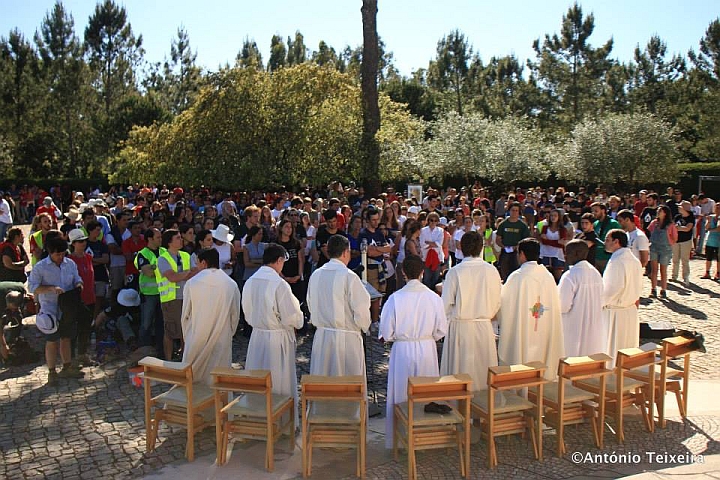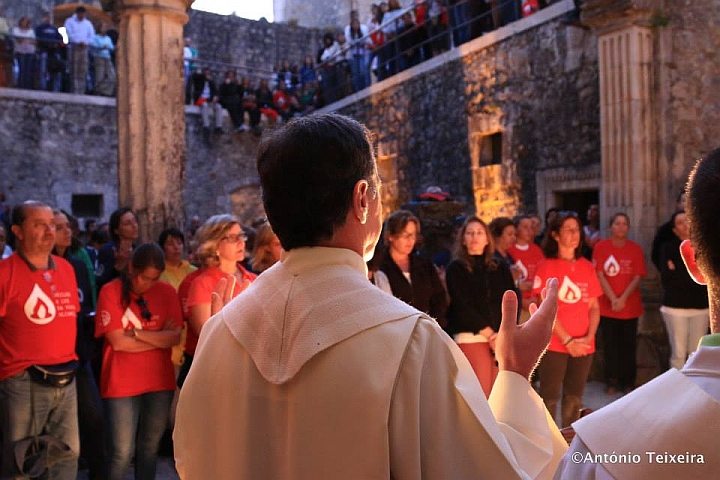Our formation
The complete formation of a Schoenstatt Fathers lasts for about 10 years. According to the recommendation of our Founder Fr Joseph Kentenich, the priestly ordination occurs from the age of 30 on.
Our training includes three components: spiritual formation, academic study, and practical preparation for the priesthood. Over the decade of formation, these three components take place and alternate in a complementary way.
When a young man has matured to the decision to become a priest and first applies to the Community, he is called a candidate.

Become a candidate
Many young men in the groups we work with are curious about our life as Schoenstatt Fathers. Everyone who is really interested in knowing our Community is welcome in our houses, and we will always try to answer all the questions.
What we call a “candidate” is someone who has officially applied in written to enter the Institute. Depending on how soon someone decides about his vocation, and also depending on the countries and the local formation curriculum, it is possible that someone is a candidate for a long time, while he completes the final years of school before going to university, or even the first years of philosophy and theology in university, until a suitable novitiate course begins. During this time, in some countries, the candidates already live together in formation houses of the Institute. In other countries they stay with their families.

Not more than six months before the novitiate, and in an official ceremony of acceptance into one of the territories (Provinces) of the Institute, a candidate becomes a so-called postulant.
Postulancy
The postulancy is an important time to experience the Community for the first time. It may last from 3 months to one year. The period depends, in each individual case, on the more or less necessary introduction to faith, religious life and Schoenstatt basics. It is also determined by the waiting time for enough candidates to apply, so that a course for the novitiate can be formed.

Novitiate – a concentrated time of blessings and grace
The novitiate is the time of intensive introduction into our vocation and community. It is divided into a “closed” period of one year, an internship of 6 months and a further 6 months of Propaedeuticum.
The first year focuses on the spiritual formation of the novices, on the introduction to Schoenstatt spirituality and on the formation of the course community. This is backed up in our Constitution, which assures the lasting existence of the course community during the whole life of its members. The course life aims to give impulses to the individual members and from them to the whole Institute.

A six-month internship follows – most of the times in a social work – in order to practice and prove the acquired spiritual life in a normal everyday environment.
The last six months begin with an individually accompanied retreat of several weeks, which is followed by a Propaedeuticum – study units that build a bridge from the Schoenstatt spirituality to the study of philosophy and theology.
The superior studies
After the novitiate, the philosophical and theological studies follow. Depending on the studies already concluded by the individual member prior to novitiatie and on the curriculum in each country, the study will go on for about 3-5 years and will take place in a college or university accredited by the Church and if possible also by the respective state.
The consecration-contract in the course of study
Membership in the Community takes place in stages, always by request of the individual and acceptance on the part of the Community. It begins with the admission to the novitiate, which concludes with a first consecration-contract valid for 2 years. This consecration-contract may be renewed for another 2 years. A third temporal consecration-contract follows, which may be signed for different periods (1 to 3 years), depending on how much time the individual member needs until he can complete the studies and reach the diaconate.

It is followed by the “perpetual contract-consecration” – together with the diaconate ordination – which applies to the rest of the member’s life. According to the wish of our founder, who has always wanted to build upon free attachments, our Institute has a special privilege: the contract with the Community may be terminated freely even after the perpetual consecration-contract after careful consideration. On the part of the Community this can not happen (at most in a special procedure after serious infringements of the individual against the reputation and discipline of the Community or the Church).
Only when you work as a priest will you know if it feels right for you
Pedagogical Internship and First Tertianship
The study program is interrupted by a 9-month internship and a 3-month tertianship. The former is intended primarily to stimulate and assess the educational ability of the member and therefore preferably takes place in an appropriate facility – the centers of the Schoenstatt Movement, a school, a parish. The latter evaluates the internship and sets the formation of the novitiate on, in order to review and deepen the spiritual life.
Practical Pastoral Training
At the end of the academic studies a first pastoral formation for the priestly ministry begins. This is also the period for the diaconate ordination and the diaconate service with different lengths, usually not more than one year.
After the priestly ordination every confrere spends about 1 to 2 years working in the ordinary pastoral care of a parish. This is followed by concrete appointments to serve the Schoenstatt Movement and the Church. A specific formation may follow, depending on the interest and talent of the individual and the needs of the Institute. Higher studies may also follow towards a master or doctorate degree. The pastoral formation continues a few years after the ordination in a second phase, which helps to evaluate the first pastoral experiences.

Second Tertianship
After this, the spiritual formation also takes a preliminary conclusion in a 2nd tertianship. This is meant for the workup of all experiences, especially in early childhood, adolescence and career so that the confrere comes to a mature inner balance, so consistent as possible, to be able to wholeheartedly serve other people and be available for the tasks of the Institute.

 Deutsch
Deutsch Español
Español
